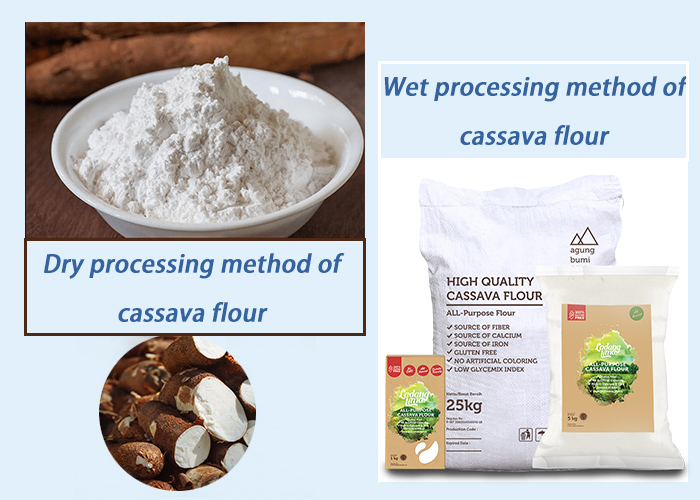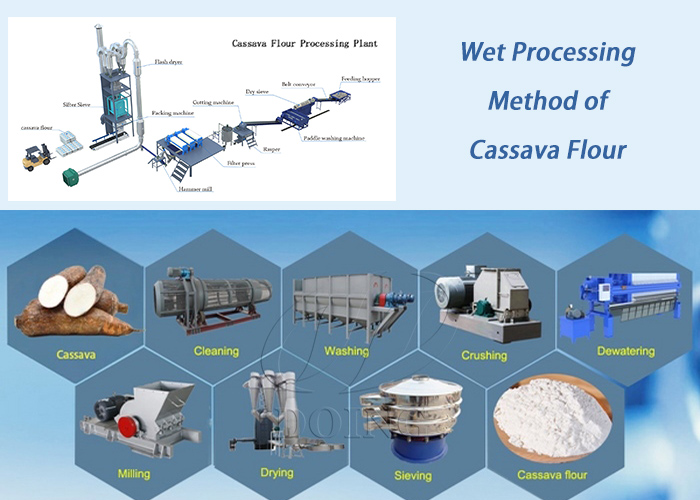 Tel/WhatsApp
Tel/WhatsApp
 Home>FAQ>Two Processing Methods of Cassava Flour: What are the Differences between Dry and Wet Methods?
Home>FAQ>Two Processing Methods of Cassava Flour: What are the Differences between Dry and Wet Methods?
Two Processing Methods of Cassava Flour: What are the Differences between Dry and Wet Methods?
Cassava flour can be produced using either dry or wet processing methods. So what are the differences between dry and wet methods? Next we will explore the differences between these two method and the advantages and disadvantages of each.
 Different quality cassava flour under two processing methods
Different quality cassava flour under two processing methods
Dry Processing Method of Cassava Flour
The dry processing method of cassava flour is the more traditional method. First of all, cassava tubers are peeled and cut into thick slices. After peeling, most of the water in raw cassava is removed by the belt dryer, and then the cassava slices are ground into powder to get finished cassava flour. This method means the lower investment cost, but relatively speaking, the cassava flour made is of low whiteness, high sand content, poor taste.
Wet Processing Method of Cassava Flour
The wet processing method of cassava flour is a more modern and automated method. It is divided into three major steps.The first is the cleaning section, the main task of this stage is to wash the cassava and then remove the inner and outer skin. The second is the processing section, which breaks up the peeled cassava as much as possible and then squeezes out part of the water inside through a dewatering machine. Finally, in the drying section, the extruded cassava is put into the airflow dryer to dry the cassava powder.
 The processing technology and equipment of cassava flour with wet method
The processing technology and equipment of cassava flour with wet method
Compared with the dry processing method of cassava flour, the wet method has higher input cost, but the quality of the produced cassava flour is obviously higher than that of the dry method, which is suitable for large cassava flour production enterprises, with numerical control management to ensure a stable production process, short processing cycle, and high economic efficiency. Besides, the dry processing method can be more labor-intensive, as the cassava slices need to be manually loaded onto the belt dryer. In contrast, the wet method is more automated, and much of the processing is done by machines.
Do you wanna set up a cassava flour factory? After knowing the processing methods of cassava flour, if you also wanna know more about the equipment for building a factory, you can contact us. We are Jinrui company, a professional supplier of cassava flour processing machines and our technicians and salesman will discuss the solution design with you!
-
 Equipment Design in a Garri Processing Factory
Equipment Design in a Garri Processing Factory
-
 Why sand roller cassava peeling machine is more suitable for cassava processing?
Why sand roller cassava peeling machine is more suitable for cassava processing?
-
 How Many Types of Cassava Peeler Are Available on the Market & How to Choose?
How Many Types of Cassava Peeler Are Available on the Market & How to Choose?
-
 How to Choose a Reliable Bammy Making Plant? Key Factors List
How to Choose a Reliable Bammy Making Plant? Key Factors List
-
 How to Produce International Standard Cassava Starch?
How to Produce International Standard Cassava Starch?
-
 Move Beyond Local Cassava Pressing Machines with Henan Jinrui Reliable Equipment
Move Beyond Local Cassava Pressing Machines with Henan Jinrui Reliable Equipment
-
 Garri Processing vs. Cassava Starch Processing: Which is More Profitable and Easier to Start?
Garri Processing vs. Cassava Starch Processing: Which is More Profitable and Easier to Start?
-
 Investing in Cassava Starch Processing? Start with the Key Equipment for Success in Vietnam/Thailand Markets
Investing in Cassava Starch Processing? Start with the Key Equipment for Success in Vietnam/Thailand Markets
-
 The Potato Starch Processing Opportunity in 2025: Benefits and Challenges
The Potato Starch Processing Opportunity in 2025: Benefits and Challenges
-
 How to Choose Cassava Starch Processing Machine with Limited Capital to Cater for Both Farmers and Market?
How to Choose Cassava Starch Processing Machine with Limited Capital to Cater for Both Farmers and Market?
-
 Henan Jinrui delivers attieke processing equipment to the customer in Côte d'Ivoire
Henan Jinrui delivers attieke processing equipment to the customer in Côte d'Ivoire
-
 Henan Jinrui Successfully Ships Cassava Flour Processing Line to Madagascar Client
Henan Jinrui Successfully Ships Cassava Flour Processing Line to Madagascar Client
-
 Henan Jinrui Advanced Cassava Starch Processing Equipment Wins Over Nigerian Food Processor
Henan Jinrui Advanced Cassava Starch Processing Equipment Wins Over Nigerian Food Processor
-
 Henan Jinrui Delivers Custom 1TPD Garri & Attieke Making Equipment to Benin
Henan Jinrui Delivers Custom 1TPD Garri & Attieke Making Equipment to Benin
-
 Henan Jinrui Secures Order from Benin for 1-Ton Daily Garri and Attieke Processing Machines
Henan Jinrui Secures Order from Benin for 1-Ton Daily Garri and Attieke Processing Machines
CONTACT US
DOING company offers cassava processing machine from single machine to the complete production line. If you want to get more details about cassava processing machine, please contact us:
- Do you want to buy machine?
- Yes, I want to buy machine
- No, I want to learn more in advance.
- What is your raw material?
- Cassava
- Potato
- Sweet potato
- Others
- 2. What is the final product you want to produce?
- Garri
- Cassava flour
- Cassava starch
- Cassava chips
- Attiekie
- Bammy
- Others
- 3.What is your capacity plan?
- Small scale garri machine
- 1ton per day
- 2tons per day
- 3tons per day
- 10tons per day
- 20tons per day
- Others
- 3.What is your capacity plan?
- Small scale
- 5tons per day
- 10tons per day
- 20tons per day
- 50tons per day
- 100tons per day
- Others
- 3.What is your capacity plan?
- Small scale
- 5tons per day
- 10tons per day
- 20tons per day
- 50tons per day
- 100tons per day
- 200tons per day
- 300tons per day
- Others
- 3.What is your capacity plan?
- Small scale
- Middle type
- Large scale
- What is your capacity plan?
- Small scale
- 5tons per day
- 10tons per day
- 20tons per day
- 50tons per day
- 100tons per day
- 200tons per day
- 300tons per day
- Others







